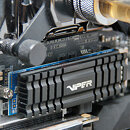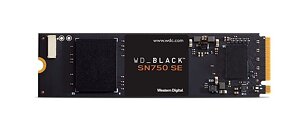Chinese Company UNIS Develops M.2 Gen 5 DRAMless SSD with 14.9 GB/s Max Sequential Speeds
Chinese PC hardware company UNIS, a subsidiary of the Tsinghua Unigroup, unveiled a potentially disruptive new consumer M.2 Gen 5 NVMe SSD that could undercut the fastest Gen 5 drives in its form-factor. The new UNIS S5 is built in the M.2-2280 form factor, with a PCI-Express 5.0 x4 host interface. The company claims a maximum sequential read speed of 14.9 GB/s, which is higher than that of the current M.2 Gen 5 NVMe client-segment SSDs. Here's how the drive could undercut its Western contemporaries—it's DRAMless.
The drive features a first-party SSD controller designed by UNIS, which relies on HMB (host memory buffer) technology. Besides its 14.9 GB/s max read speeds, the drive offers a maximum sequential write speed of 12.9 GB/s—also among the highest in the industry—and 4K random access performance of up to 1.8 million IOPS reads, with up to 1.7 million IOPS writes. The performance claims make the UNIS S5 significantly faster than any DRAMless Gen 5 SSD, with the fastest such drives offering around 12 GB/s sequential transfer speeds; and faster than drives based on a DRAM-cached controller platform. For instance, the recently launched Samsung 9100 PRO offers up to 14.8 GB/s sequential reads, but at higher sequential write speeds of up to 13.4 GB/s. Pictured below is the UNIS S5 Ultra, the company's flagship drive based on a proprietary DRAM-cached controller.
The drive features a first-party SSD controller designed by UNIS, which relies on HMB (host memory buffer) technology. Besides its 14.9 GB/s max read speeds, the drive offers a maximum sequential write speed of 12.9 GB/s—also among the highest in the industry—and 4K random access performance of up to 1.8 million IOPS reads, with up to 1.7 million IOPS writes. The performance claims make the UNIS S5 significantly faster than any DRAMless Gen 5 SSD, with the fastest such drives offering around 12 GB/s sequential transfer speeds; and faster than drives based on a DRAM-cached controller platform. For instance, the recently launched Samsung 9100 PRO offers up to 14.8 GB/s sequential reads, but at higher sequential write speeds of up to 13.4 GB/s. Pictured below is the UNIS S5 Ultra, the company's flagship drive based on a proprietary DRAM-cached controller.






















































































